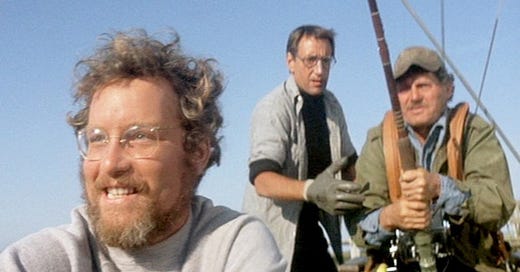Quint, Hooper and Brody: The three non-amigos

I hadn't seen "Jaws" in a long time until I allowed my boys, ages 7 and almost-5, to watch it with me the other day. Forty-plus years after its debut, it's still a dazzling film, the movie that launched the summer movie craze. The craftsmanship of it is just audacious, from the swooping camera work to the sheer terror-inducing power of "Bruce," the (famously uncooperative) robotic shark.
But it's the surprisingly good storytelling (screenplay by Peter Benchley and Carl Gottlieb, based on the former's novel) and acting that carries the day.
Great movies are marked by finding something new and intriguing about them every time you watch, and what spurred my curiosity after this viewing of "Jaws" was the power dynamic between the three principle characters: Chief Brody (Roy Scheider), Captain Quint (Robert Shaw) and Matt Hooper (Richard Dreyfuss). As good as the first half of the movie is, it really kicks into a higher gear when the trio boards Quint's ship, the Orca, to hunt down the 25-foot Great White that's been feeding off of the fictional Amity Island.
Hooper doesn't enter the movie until nearly halfway through, yet within two minutes it feels as if his character has been present the entire time. He and Brody, the beleaguered landlubber chief of police, immediately display a natural affinity for each other. Hooper calls Brody the only sane man on the island excepting himself, and Brody uses Hooper's authority as an oceanographer as his chief evidence in his battle with the mayor and his henchmen on the city council, who only want to keep the beaches open and the tourism dollars rolling in.
Quint takes an immediate dislike to Hooper, chastising him for his fancy college degree and expensive fish-finding equipment. After he easily passes the shark-hunter's verbal quizzes and knot-tying test, Quint demands to see his hands and declares them soft: "You've got city hands, Mr. Hooper ... been counting money all your life."
Quint has obvious reasons to resent Hooper: he's a rich kid who plays with sharks by choice, whereas Quint is a blue-collar seaman who hunts the creatures with Ahab-like obsession, still haunted by his experience after the U.S.S. Indianapolis was sunk, as regaled in the film's most memorable scene.
Hooper is fascinated by sharks; Quint is driven to destroy them.
And yet, Quint continually treats Brody with respect. Oh, it's a mocking sort of regard, to be sure. He loves to crack jokes and order Brody around, making sure the LEO understands his subservient place aboard his ship. Yet he always refers to him as "Chief Brody" or just "Chief," and doesn't level the sort of condescending vitriol that is his standard M.O. with Hooper.
I think this dynamic can be explained. For all his irascible, curmudgeonly independence, Quint is still a product of military life and the sea, so hierarchical and regimented roles are second nature to him. In Brody he sees a comrade with his own vested authority and set of skills, which are to be saluted if not necessarily respected inside his dank heart.
Indeed, I think Quint likes having Brody aboard his ship because the Chief is so inept at life at sea, it serves to cement Quint's status as the unquestioned master and expert. On land he acquiesces to Brody's position as the enforcer of laws, and on the water they trade the mantle of authority both men implicitly acknowledge.
Hooper stands outside all of that. He works for an oceanographic institute, but it's something he does by choice outside of economic necessity. He's about to embark on an 18-month voyage studying sharks, the sort of research sabbatical college professors undertake. In Quint's eyes, Hooper is basically a hippie with a diploma, a member of the youth movement come to invade his little fiefdom upon the waves.
And there's another reason he hates Hooper. Brody, who doesn't even like to swim in the ocean, represents no challenge to Quint's authority, for the reasons I've outlined. But in Hooper he recognizes someone whose seamanship and expertise on sharks is at least equal to his own -- and in that he sees an unlikable threat that must be mocked and challenged.
It's notable that after the famous "scars" drinking party -- in which Brody is only an observer, not a participant -- Quint's attitude toward Hooper brightens considerably. When the chips are down, he even prompts Hooper about his shark cage idea -- allowing himself the possibility that the scientist may be able to accomplish something with his contraption that the grizzled shark-slayer cannot with his harpoons and float barrels.
"Jaws" may be the most famous fish tale ever made into a movie, but what provides its enduring appeal is the dynamic of three men with various sets of enmities and affinities, who find themselves allied in a heroic quest that they've each undertaken for very different reasons.



